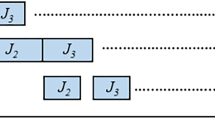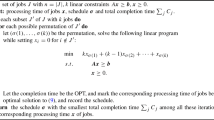Abstract
Switching machines on and off is an important aspect of unit commitment problems and production planning problems, among others. Here we study tight mixed integer programming formulations for two aspects of such problems: bounded length on- and off-intervals, and interval-dependent start-ups. The problem with both these aspects admits a general Dynamic Programming (shortest path) formulation which leads to a tight extended formulation with a number of binary variables that is quadratic in the number n of time periods. We are thus interested in tight formulations with a linear number of binary variables. For the bounded interval problem we present a tight network dual formulation based on new integer cumulative variables that allows us to simultaneously treat lower and upper bounds on the interval lengths and also to handle time-varying bounds. This in turn leads to more general results, including simpler proofs of known tight formulations for problems with just lower bounds. For the interval-dependent start-up problem we develop a path formulation that allows us to describe the convex hull of solutions in the space of machine state variables and interval-dependent start-up variables.


Similar content being viewed by others
References
Conforti, M., Cornuéjols, G., Zambelli, G.: Integer Programming. Springer, New York (2014)
Damcı-Kurt, P., Küçükyavuz, S., Rajan, D., Atamtürk, A.: A polyhedral study of ramping in unit commitment. Math. Program. Ser. A 158, 175–206 (2016)
Frangioni, A., Gentile, C.: Solving nonlinear single-unit commitment problems with ramping constraints. Oper. Res. 54(4), 767–775 (2006)
Frangioni, A., Gentile, C., Lacalandra, F.: Tighter approximated MILP formulations for unit commitment problems. IEEE Trans. Power Syst. 24, 105–113 (2009)
Garver, L.L.: Power generation scheduling by integer programming–development of theory, power apparatus and systems. III Trans. Am. Inst. Electr. Eng. 81(3), 730–734 (1963)
Hedman, K.W., O’Neill, R.P., Oren, S.S.: Analyzing valid inequalities of the generation unit commitment problem. In: Power Systems Conference and Exposition, 2009 PSCE ’09. IEEE/PES, pp. 1–6 (2009)
Knueven, B., Ostrowski, J., Wang, J.: Generating cuts from the ramping polytope for the unit commitment problem Department of Industrial and Systems Engineering University of Tennessee(2016)
Lee, J., Leung, J., Margot, F.: Min-up/min-down polytopes. Discrete Optim. 1, 77–85 (2004)
Malkin, P.: Minimum runtime and stoptime polyhedra. In: Working Paper, Core, Université catholique de Louvain (2003)
Martens, M., McCormick, S.T., Queyranne, M.: Separation, dimension, and facet algorithms for node flow polyhedra. Math. Program. Ser. B 24, 317–348 (2010)
Morales-España, G., Gentile, C., Ramos, A.: Tight MIP formulations of the power-based unit commitment problem. OR Spectr. 37(4), 1–22 (2015)
Morales-España, G., Latorre, J.M., Ramos, A.: Tight and compact MILP formulation for the thermal unit commitment problem. IEEE Trans. Power Syst. 28, 4897–4908 (2013)
Nemhauser, G.L., Wolsey, L.A.: Integer and Combinatorial Optimization. Wiley, New York (1988)
Ostrowski, J., Anjos, M.F., Vannelli, A.: Tight mixed integer linear programming formulations for the unit commitment problem. IEEE Trans. Power Syst. 1(27), 39–46 (2012)
Pan, K., Guan, Y.: A Polyhedral Study of the Integrated Minimum-Up/Down Time and Ramping Polytope. http://www.optimization-online.org/DB_HTML/2015/08/5070.html (2015)
Pochet, Y., Wolsey, L.A.: Production Planning by Mixed Integer Programming. Springer, New York (2006)
Queyranne, M., Wolsey, L.A.: Modeling poset convex subsets. In: Cologne-Twente Workshop, Istanbul (2015)
Rajan, D., and Takriti, S.: Minimum up/down polytopes of the unit commitment problem with start-up costs. IBM Res. Rep. RC23628 (W0506-050), Thomas J. Watson Research Center, Yorktown Heights, NY (2005)
Viana, A., Pedroso, J.P.: A new MILP-based approach for unit commitment in power production planning. Electr. Power Energy Syst. 44, 997–1005 (2013)
Wolsey, L.A.: Integer Programming. Wiley, New York (1998)
Wu, L.: A tighter piecewise linear approximation of quadratic cost curves for unit commitment problems. IEEE Trans. Power Syst. 26, 2581–2583 (2011)
Author information
Authors and Affiliations
Corresponding author
Additional information
This research has been funded by the Interuniversity Attraction Poles Programme initiated by the Belgian Science Policy Office.
Rights and permissions
About this article
Cite this article
Queyranne, M., Wolsey, L.A. Tight MIP formulations for bounded up/down times and interval-dependent start-ups. Math. Program. 164, 129–155 (2017). https://doi.org/10.1007/s10107-016-1079-2
Received:
Accepted:
Published:
Issue Date:
DOI: https://doi.org/10.1007/s10107-016-1079-2
Keywords
- Production sequencing
- Unit commitment
- Bounded up/down times
- Interval-dependent startups
- Tight MIP formulations
- Convex hulls




